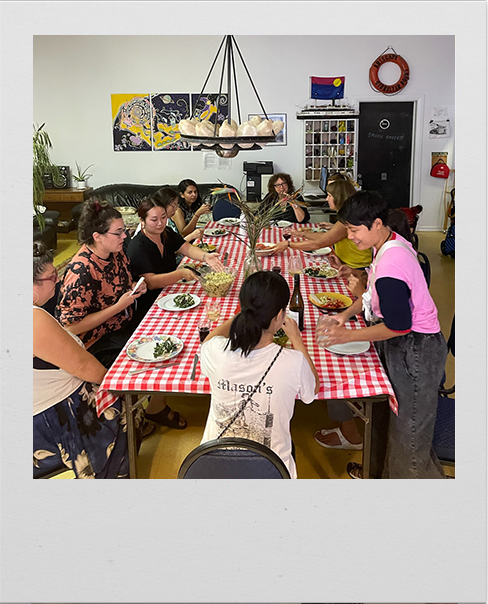
AGAINST FEMINIST FORGETTING
2022
“Against feminist forgetting: strategies for intergenerational collaboration in the arts” is a one-year program of mini residencies, out-loud reading groups, and the building of a mobile library that will research strategies to intervene in feminist forgetting: the tendency for intergenerational knowledge to fail to make the “jump” across communities of feminist practitioners.
In 2022, EMILIA-AMALIA invited six curators, writers and cultural workers to undertake mini residencies, working for the first time in our own bricks and mortar space, a studio in downtown Toronto.
These guest residencies provided space for the residents to pursue their research, while also contributing to the group’s ongoing practice investigating tools for intergenerational knowledge transmission. Each resident will research tactics for collaboration used by feminist practitioners in the past, share their in-progress research and generate a list of books to contribute to E-A’s mobile library. Some may host public, out-loud reading groups during their tenure at the E-A residency.
Our collaborators include:
Ivetta Sunyoung Kang is a South Korean-born artist working across research, cinema, installation, text, performance and participation. She has presented internationally, including at the Smithsonian Hirshhorn Museum and Sculpture Garden and ArtScience Museum and participated in AiR programs at the AGO X RBC Artist-in-Residence at Art Gallery of Ontario and DAÏMÔN in Gatineau. She curiously wanders around multicultural psychoanalysis studies and post-colonial debris in search of unsettling languages and unrealized emotions. At EMILIA-AMALIA, Ivetta is keen on observing how indexing and personal storytelling collide and how indexed knowledge and exquisite utterances of gatherings entangle. Ivetta is working on a semi-new performance piece, Cornered, with the inquiries.
Jordan King is a multi-disciplinary creative with experience across an array of international professional settings. Her work is focused on gender expression and identity exploration, incorporating elements of the milieus that shaped her identity. These include drag performance and the traditions of trans performers in cabaret/burlesque spaces. She is simultaneously an artist, archivist, and historian, with a practice rooted in archival research and intergenerational connectivity among trans femme performers and queer elders. King’s research and personal writing focus is the confluence of drag culture and trans identity, historically a liminal, transitional space, but one which holds incredible beauty and promise for a trans celebratory future. Recent projects include: Story Editor, “Empress of Vancouver”, Lantern Films (Documentary feature film project currently in production); “INK” – Illustrations of Connie Fleming (NY) at Centre Never Apart, Montreal July – Sept 2021; “Full Coverage” – Paintings of James Tuitt (London) at Centre Never Apart, Montreal, July – Sept 2021; “Digitizing Indigeneity” – Multi-media works of Preston Buffalo (Vancouver) at Centre Never Apart, Montreal Canada, April – June 2021; “Bijoux” Podcast mini series (Oral history interviews); and Radio Never Apart podcast (Oral history interviews).
Marsya Maharani (she/her) is a curator working exclusively in collaboration with others, including as part of the collectives Gendai and Younger than Beyonce (YTB). Working from the position of an immigrant from Indonesia and settler in Tkaronto/Toronto, her projects explore experimentation in learning and working together that nourishes culturally diverse ways of thinking, specifically in relation to feminism, decolonization, and meaningful inclusion in institutional and cultural contexts. In her research on alternative curatorial methodologies and how collective practices can form new grounds for ethical institutional structures, labour conditions, and workplace culture, Marsya has visited and taken up residencies with art collectives in Jakarta, Jogjakarta, Shanghai, and Dhaka. Marsya recently served on the board of SAVAC (South Asian Visual Arts Centre) and was a Toronto Arts Council Leaders Lab Fellow in 2020.
Petrina Ng (she/her) is an artist and organizer based in Tkaronto/Toronto. Her practice proposes alternative responses to redress subtle legacies of colonialism. Petrina’s collaborative work as Gendai (with curator Marsya Maharani) responds to BIPOC labour conditions of arts work. Their research and practice of collective values experiments with alternative economies and radical allyship to work towards a more equitable arts sector. She is also co-founder of Durable Good, a small publishing studio that supports artists, writers, and thinkers who work within feminist, equitable, and engaged frameworks; and newly launched Waard Ward collective that utilizes floristry as a means to embody decolonial research and newcomer community building.
Daniella Sanader is a writer and reader based in Toronto. In her work, she explores oblique and “incorrect” ways of enacting research: through speculation, meandering, overidentification, misunderstanding, reading too closely, and admitting to what you don’t know. Her writing has appeared in Canadian Art, Artforum.com, C Magazine, Border Crossings, Maclean’s, The Brooklyn Rail, esse magazine, and others. Her texts have also been published by a number of galleries and artist-run spaces across Canada and internationally. She has curated projects for Vtape, Oakville Galleries, Open Studio, LOMAA, and Gallery TPW. In January 2018, she was named the annual Emerging Cultural Leader by the Artist-Run Centres and Collectives of Ontario (ARCCO). She was also a participant in the Critical Art Writing Ensemble III at the Banff Centre in 2018. She holds a SSHRC-funded MA in Art History and Gender Studies from McGill University (2013), and she is currently a PhD Student in Art History & Visual Culture at York University.
Emma Steen is a freelance curator and writer, as well as the Community Relations Manager for the Indigenous Curatorial Collective. Her area of interest lies in art that explores bodies, sex and love with anti-colonial intention. Her background also includes extensive work in community arts organizing, arts administration, and supporting methods of institutional accountability. Emma has worked as a writer and editor, contributing her writing to Canadian arts & culture magazines and art galleries. She was awarded OCAD’s 2020 Master’s Thesis/MRP Writing Awards for her paper, “Why the 90s Were so Sexy: locating sexuality, pleasure and desire in work produced by Indigenous women identified artists during the 1990s and early 2000s in Canada.”
This program is supported by the Canada Council for the Arts’ Research and Creation Grant.
